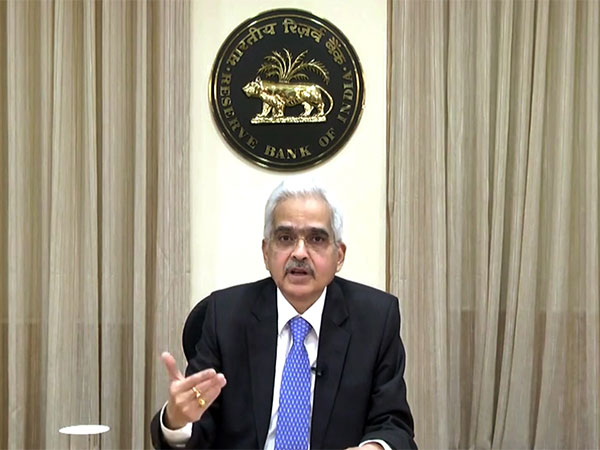
New Delhi: Reserve Bank of India (RBI) Governor Shaktikanta Das on Monday said the recent wave of financial market reforms spearheaded by the RBI are geared towards establishing a robust foundation for addressing the burgeoning funding needs of the economy, providing cost-effective hedging alternatives, and enhancing competitiveness in global markets.
The RBI governor said this in his address at the Fixed Income Money Market and Derivatives Association of India- Primary Dealers' Association of India (FIMMDA-PDAI) Annual Conference in Barcelona on April 8.
Das said, "The recent financial market reforms undertaken by the Reserve Bank are aimed at providing a strong bedrock for markets to move to the next trajectory for meeting the growing funding requirements in the economy, providing cost effective hedging options and competing effectively in global markets."
Retail investors' engagement in government securities (G-secs) through the Retail Direct scheme has seen significant growth, while the Voluntary Retention Route (VRR) scheme has garnered interest from Foreign Portfolio Investors (FPIs), particularly in corporate bonds.
Das said, "Retail participation in G-secs through the Retail Direct scheme has been growing. The VRR scheme has attracted interest from FPIs, especially for corporate bonds. In recent months, robust foreign inflows in G-secs have been witnessed. Non-resident participation in OTC derivative markets has increased, adding to liquidity and diversity."
The reform initiatives, spanning various dimensions, have aimed to streamline capital raising, eliminate segmentation between onshore and offshore markets, broaden market participation, foster innovation, fortify market integrity and resilience, and ensure fair conduct by all stakeholders.
Governor Das lauded the positive response to regulatory measures, noting the widening participation base across various segments.
Foreign inflows into G-secs have surged in recent months, alongside increased non-resident participation in Over-the-Counter (OTC) derivative markets, enriching liquidity and diversity.
Notably, convergence in prices and spreads between domestic and overseas markets has been achieved to a considerable extent.
However, Governor Das highlighted areas necessitating further attention.
He underscored the imperative of expanding the participation of domestic banks in derivative markets, both domestically and offshore, to augment market depth and resilience.
Governor Das said, "The participation of domestic banks in derivative markets remains limited with only a small set of active market-makers. Participation of Indian banks in global markets is growing but it is quite small. Domestic banks are dealing with market-makers in global markets rather than with end clients and are yet to emerge as market makers of note globally."
While acknowledging the progress made, he emphasised the need for prudence in navigating global markets.
Governor Das emphasised the imperative of enhancing liquidity in OTC derivatives markets, particularly in interest rate derivatives, to facilitate efficient hedging.
Governor Das stated, "Liquidity in OTC derivatives markets, especially interest rate derivatives, remains confined to a few products, constraining efficient hedging by the larger economy."
He added, "The market for credit derivatives which is an important enabler for the lower rated corporate bonds is yet to take off. I am, however, happy to note that the first credit default swap (CDS) transaction after the issuance of the revised guidelines came into effect in May 2022 was undertaken last week."
Despite recent strides, the market for credit derivatives, crucial for lower-rated corporate bonds, remains nascent, albeit witnessing initial transactions following revised guidelines.
Transparency in pricing emerged as a focal point for improvement, with Governor Das advocating for equitable treatment of retail customers and finer pricing mechanisms, especially for smaller deals.
Enhanced vigilance is warranted to curb unauthorized FX trading platforms exploiting banking channels.
Governor Das said, "Transparency in pricing remains work in progress and more can be done. The retail customer is yet to get a deal at par with large customers. There is a need for effective market-making and finer pricing for smaller deals on NDS-OM."
He added, "Divergence in pricing in FX markets for the small and large customers are wider than what can be justified by operational considerations. Banks may need to do more to facilitate the use of the FX Retail platform."
Governor Das underscored the pivotal role of technology in fostering market efficiency and expansion, with ongoing endeavors to leverage technological platforms for wider market outreach.
Efforts are underway to introduce electronic trading platforms for derivatives and expand central clearing mechanisms. Additionally, the RBI remains engaged with stakeholders to assess the introduction of new products and infrastructure in response to evolving market dynamics.
Scaling up dynamism in bank treasuries emerged as another imperative, crucial for efficient market intermediation and risk management.
Governor Das said, "Bank treasuries need to scale up their dynamism to utilize the opportunities presented in the context of the recent regulatory reforms."
The new prudential framework for bank investments, effective from the current fiscal year, offers increased flexibility but demands active treasury management to harness efficiency.
Governor Das said, "From this financial year (2024-25), the new prudential framework for investment by banks has come into effect. The new regulations provide increased flexibility to banks in managing their treasuries and offer scope for increased efficiency, provided banks manage their treasury function actively."
Governor Das emphasized the need for robust safeguards to address emerging challenges posed by new products, participants, and markets.
As India's markets integrate further with global counterparts, proactive risk management becomes paramount to capitalize on opportunities while mitigating associated risks.
Governor Das emphasized, "Appropriate safeguards should be put in place to address the new challenges posed by new products, participants, and markets."
He added, "For example, as sophisticated OTC derivative products are introduced, they must be accompanied by the adoption of certain safeguards, both by the market-makers as well as customers. As our markets get integrated with global markets and non-resident participation increases, transmission channels from global developments will become stronger and speedier."
Governor Das contextualized the recent reforms within the backdrop of an economy characterized by confidence and aspiration.
He emphasized the RBI's concerted efforts to cultivate financial markets that are not only efficient but also imbued with trust, stability, and innovation.